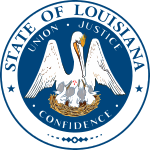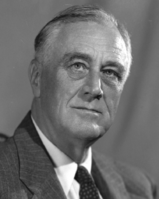| ||||||||||||||||||||||||||
All 10 Louisiana votes to the Electoral College | ||||||||||||||||||||||||||
|---|---|---|---|---|---|---|---|---|---|---|---|---|---|---|---|---|---|---|---|---|---|---|---|---|---|---|
| ||||||||||||||||||||||||||
 Parish Results
Roosevelt 60-70% 70-80% 80-90% 90-100%
| ||||||||||||||||||||||||||
| ||||||||||||||||||||||||||
| Elections in Louisiana |
|---|
 |
|
|
The 1940 United States presidential election in Louisiana took place on November 5, 1940, as part of the 1940 United States presidential election. State voters chose ten[2] representatives, or electors, to the Electoral College, who voted for president and vice president.
Until the rise of Huey P. Long, post-disenfranchisement Louisiana politics was dominated by the New Orleans-based “Choctaw Club”,[3] which overcame Socialist, Wobbly, and Progressive challenges from the outlying upcountry, Imperial Calcasieu and Acadiana regions between the late 1900s and early 1920s.[4] The three presidential elections between 1916 and 1924 saw a rebellion in Acadiana over sugar tariffs and Woodrow Wilson’s foreign and domestic policies; however, the nomination of Catholic Al Smith in 1928 rapidly restored their Democratic loyalty without causing significant upheaval in the remainder of the state, which was too focused on control of black labour to worry about Smith’s Catholicism.[5]
Following the 1928 gubernatorial primary, Louisiana politics until Brown v. Board of Education would be governed by a system of coherent “Long” and “anti-Long” Democratic factionalism,[6] as the administration of Huey Long introduced significant economic reforms, which were strongly opposed by the remnants of the old Choctaws. During the first term of Roosevelt, Long sought to capture the Presidency for himself under a “Share-Our-Wealth” program involving the confiscation of wealthy fortunes, family allowances, and government storage of agricultural surpluses.[7] However, in the ensuing years Long’s fortunes dwindled as a result of 1934 losses in the Sixth Congressional District and the New Orleans city council,[8] before Senator Long launched a siege on New Orleans and the Choctaws, combined with abolition of the state’s poll tax, in effort to regain his control over the state.[9]
Long’s assassination in 1935 meant he could not launch his planned presidential campaign against incumbent President Franklin D. Roosevelt. The 1936 election had seen sugar-dependent Assumption and Lafourche parishes defect to the GOP at a presidential level due to disagreements with Democratic tariff policy.[5] However, as in 1928, this rebellion would be reversed, this time by Roosevelt’s strong support for aid to distressed France in World War II by those parishes’ Creole and Cajun populations who were strongly tied to France.[10] Roosevelt and Agriculture Secretary Henry A. Wallace thus won Louisiana with 85.88 percent of the popular vote, against Republican nominees Wendell Willkie and Senate Minority Leader Charles L. McNary, with 14.09 percent.[11][12]
By percentage of the vote carried, Louisiana was the third-most lopsided contest in the nation, only behind South Carolina and Mississippi, whose margins both exceeded 90% in favor of Roosevelt.
- ^ "United States Presidential election of 1940 — Encyclopædia Britannica". Retrieved August 21, 2018.
- ^ "1940 Election for the Thirty-ninth Term (1941-45)". Retrieved August 21, 2018.
- ^ Wall, Bennett H.; Rodriguez, John C. (January 28, 2014). Louisiana: A History. John Wiley & Sons. pp. 274–275. ISBN 978-1118619292.
- ^ Collin, Richard H. (Winter 1971). "Theodore Roosevelt's Visit to New Orleans and the Progressive Campaign of 1914". Louisiana History: The Journal of the Louisiana Historical Association. 12 (1): 5–19.
- ^ a b Wingo, Barbara C. (Autumn 1977). "The 1928 Presidential Election in Louisiana". Louisiana History: The Journal of the Louisiana Historical Association. 18 (4). Louisiana Historical Association: 405–435.
- ^ Hansen, John Mark; Shigeo, Hirano; Snyder Jr., James M. (February 27, 2017). "Parties within Parties: Parties, Factions, and Coordinated Politics, 1900-1980". In Gerber, Alan S.; Schickler, Eric (eds.). Governing in a Polarized Age: Elections, Parties, and Political Representation in America. Cambridge University Press. pp. 165–168. ISBN 978-1-107-09509-0.
- ^ Sindler, Allan P. (1956). Huey Long's Louisiana: State politics, 1920-1952. Baltimore: Johns Hopkins University Press. pp. 84–85.
- ^ Sindler. Huey Long’s Louisiana, pp. 87-88
- ^ Sindler. Huey Long’s Louisiana, pp. 90-95
- ^ Menendez, Albert J. (2005). The Geography of Presidential Elections in the United States, 1868-2004. Jefferson, North Carolina: McFarland & Company. p. 67. ISBN 0786422173.
- ^ "1940 Presidential General Election Results ± Louisiana". Retrieved August 21, 2018.
- ^ "The American Presidency Project — Election of 1940". Retrieved August 21, 2018.


